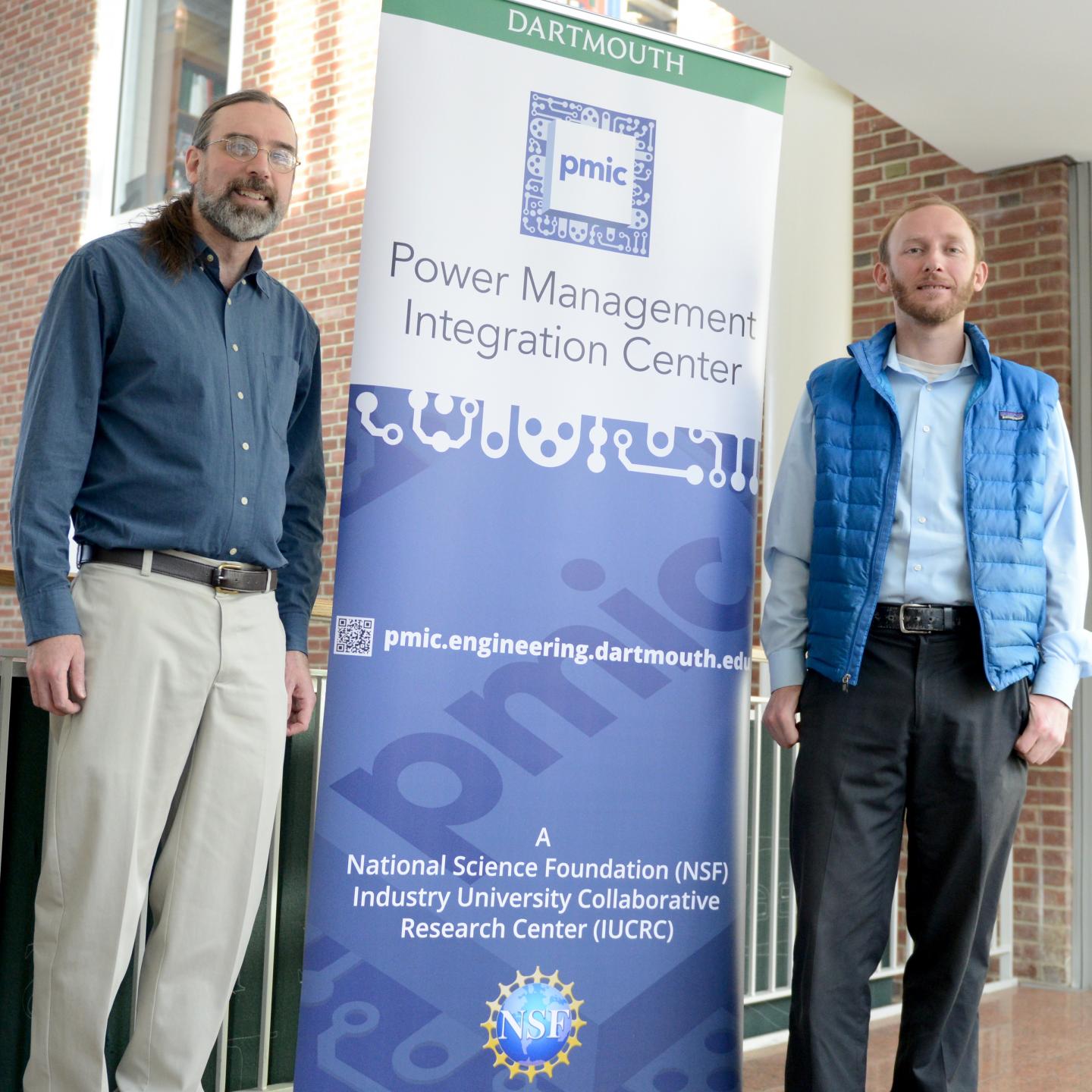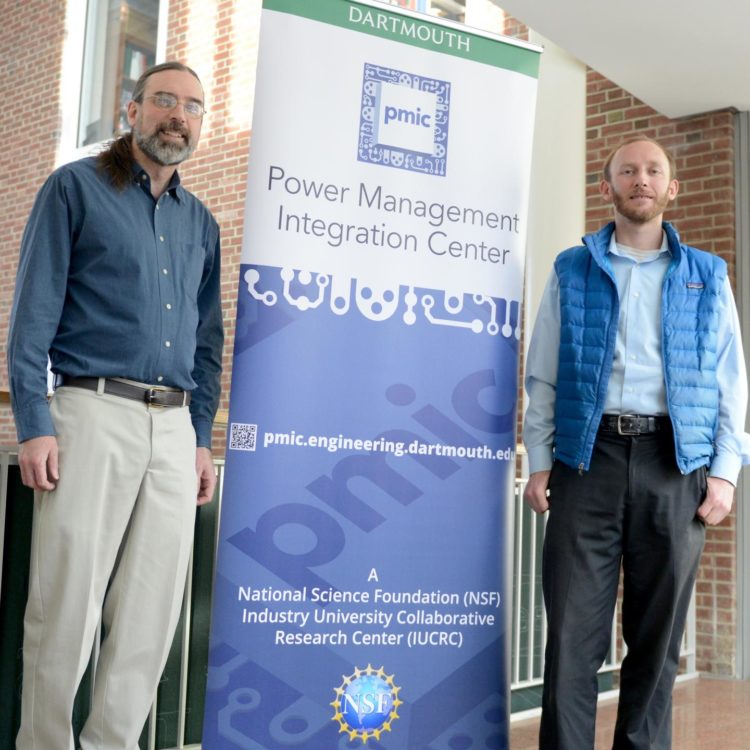Aims to transform power electronics

Credit: Kathryn Lapierre and Thayer School of Engineering at Dartmouth
Dartmouth is partnering with four leading electrical tech companies–GE Research, Analog Devices, Empower Semiconductor, and Ampt–to form the first NSF-funded Industry-University Collaborative Research Center (IUCRC) focusing on integrated power management and delivery for a wide range of electrified systems.
Providing companies with unprecedented access to Dartmouth’s R&D expertise, facilities, and intellectual property, the new Power Management Integration Center (PMIC) will address a range of challenges facing next-generation power electronics.
“Power is in almost everything,” says Dartmouth engineering professor and PMIC co-director Jason Stauth. “We want to remove technology bottlenecks and help make electronics smaller, more efficient, and cheaper for both industry and consumers.”
Micro-electronics and integrated circuits have revolutionized computing, communications, and information technology. However, as devices have shrunk, power management hardware remains a key obstacle to further reducing systems’ size and cost in virtually all applications, from mobile communications and Internet-of-Things (IoT) devices to electrified systems in automobiles, aircraft, and spacecraft.
Focusing on integrated power management circuits and systems on a chip, PMIC will work to develop new ways of achieving extreme power density and efficiency with the potential to transform transportation, communication, and energy generation and consumption. Innovations in this area can bring significant improvements to a wide variety of applications including battery life for mobile platforms, solar and electrochemical energy storage, electric cars and other electrified transportation, as well as overall cost, carbon emissions, and national energy security.
“Companies want to create products that use less energy without increasing cost,” adds Dartmouth engineering professor and PMIC director Charles Sullivan. “Researchers here are exploring and developing the technology to help them do that. PMIC will bring Dartmouth researchers and companies together.”
Member companies will share in both the cost and benefit of cutting-edge R&D and gain a higher return on investment through jointly-funded research. Membership comes with up to 12 votes on the IAB which steers the Center and provides input into plans for PMIC expansion.
Research will strive to advance technology for power circuits, systems, and components including:
- New circuit topologies, power management ICs, and discrete power converters
- Next generation passive components
- Integrated passive components for high-density power management
- System design, optimization, and control
- Reliability and robustness in power electronic circuits
- New circuit architectures and design techniques that leverage high-level integration
PMIC will emphasize passive component innovation and integration, magnetic materials and component design, and new high-density resonant structures for power delivery.
Member Testimonials
“The mission of PMIC is relevant to GE Research’s power conversion technologies that implement wide bandgap semiconductors and high-bandwidth control-architectures,” said Satish Prabhakaran, Manager at GE Global Research. “The Center’s focus on integrated power conversion and power management enable high power-density and high-efficiency power solutions that are of interest. Further, we welcome the opportunity to host PMIC-affiliated students through internships at GE Research.”
“Innovative magnetics design and power supply topologies that take advantage of these breakthroughs are critically important to advancing the state of the art in power management,” said Sam Nork, General Manager at Analog Devices. “The faculty at Dartmouth has considerable expertise in these areas, and we look forward to collaborating with the professors and students as we pursue the next generation of power management solutions.”
“We are delighted to be involved in PMIC at Dartmouth. Empower Semiconductor was founded with a similar shared belief that power management efficiency and density are core challenges facing the electronics industry” said David Lidsky, Co-Founder and Chief Technology Officer at Empower Semiconductor. “We have been successfully pushing the envelope with high-speed, ultra-small regulators with our advanced Integrated Voltage Regulators (IVR’s), and look forward to working with the talented and innovative PMIC team.”
“Research in advanced power electronics, ranging from circuit topologies to component design and integration to system design and control is highly relevant to our core focus of accelerating the clean energy revolution through optimization of solar energy conversion,” said Fernando Tomasel, VP of Engineering at Ampt. “We are glad to support and participate in PMIC, and excited at the prospects of collaborating with Darmouth’s faculty in the generation of new knowledge and the production of highly qualified professionals in the field of power electronics.”
###
Contact us to become a member.
Upcoming Events
- February 13, 1-2pm ET: UIDP webinar on PMIC. Registration is now open.
- February 16-20: PMIC Co-Directors Charlie Sullivan and Jason Stauth will present at the 2020 International Solid-State Circuits Conference (ISSCC)–Professor Sullivan will speak about the “Future of Passive Components: Chip-Scale Magnetics and High-Q Resonant Structures.” Professor Stauth’s group will present a paper in Session 11 (DC-DC Converters) on Tuesday, February 18 entitled “A Fully Integrated Resonant Switched-Capacitor Converter with 85.5% Efficiency at 0.47W Using On-Chip Dual-Phase Merged-LC Resonator,” and on February 20, Stauth is chairing an all-day forum: “Power Management as an Enabler of Future SoC’s” (current or prospective member companies are encouraged to attend).
- March 15-19: PMIC will attend the APEC Conference and Tradeshow at New Orleans’ Ernest N. Morial Convention Center (Booth #2143). Charles Sullivan will deliver a keynote at the pre-conference magnetics workshop entitled, “Survey of Winding Techniques Used in Power Magnetic Components,” as well as multiple additional presentations throughout the workshop and conference.
- March 22-25: PMIC Co-Director Jason Stauth will have two students presenting papers accepted at the IEEE Custom Integrated Circuits Conference (CICC) in Boston.
- July 23 & 24: The third in a series of PMIC Industry Advisory Board (IAB) meetings in Hanover, NH. Any company, federal R&D organization, or government-owned contractor-operated laboratory may attend and become a member.
Media Contact
Julie Bonette
[email protected]
Original Source
https:/





